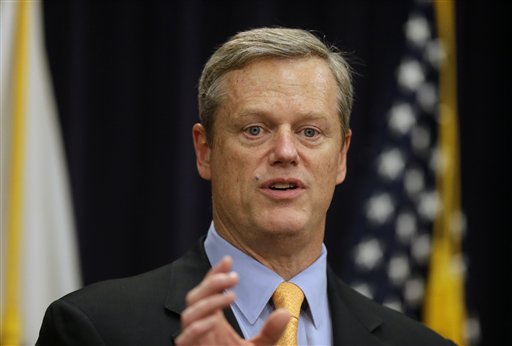BOB SALSBERG, Associated Press
BOSTON (AP) — Gov. Charlie Baker on Wednesday filed what he called a fiscally responsible $39.6 billion state budget that calls for no increases in state taxes or fees and shrinks a structural deficit between the growth in annual spending and revenues.
“We believe that getting state spending under control to the point where spending grows at a rate that is similar to the economy is essential to the state’s economic health going forward,” the Republican said shortly after submitting to the Legislature the spending plan for the fiscal year starting July 1.
The budget calls for an overall 3.5 percent increase in spending, but many state agencies will receive little or no additional money over current levels. Tax revenues are projected to rise 4.3 percent in the next fiscal year.
Administration officials said the deficit currently stands at $635 million, down from $1.8 billion when Baker took office last January.
Governors and lawmakers have typically relied on an array of one-time revenues and other temporary fixes to close annual shortfalls, a tactic Baker said he was determined to gradually move away from. The fiscal 2017 budget calls for $253 million in one-time solutions, down from $1.2 billion in fiscal 2015.
To erase the remaining gap, Baker is proposing several steps including reforms intended to save nearly $300 million in Medicaid costs without reducing benefits. Overall Medicaid spending would still rise about 5 percent.
The budget also calls for depositing at least $206 million into the state’s reserve, or “rainy day” fund, replenishing some of the millions that have been diverted to the general fund in recent years, much to the alarm of credit rating agencies.
“Saving money for a rainy day, especially in good times, is a must,” said Baker.
Some areas of state government would see spending increases in the administration’s budget.
The state Department of Children and Families, for example, would receive additional funds to hire 281 new social workers and reduce staggering caseload levels. The spending plan also sets aside $140 million to address the state’s opioid addiction crisis, much of it to support treatment and recovery services.
Baker previously announced a $42 million increase in unrestricted local aid to cities and towns, and a $72 million hike in direct assistance to public schools. The budget also calls for a $20.5 million increase in reimbursements the state makes to school districts for charter school tuition.
Still, the plan is likely to be a disappointment to those advocating for greater state investment in areas such as education and transportation.
Noah Berger, president of the independent Massachusetts Budget and Policy Center, said it was largely a “status quo” budget despite some positive elements.
“There are no major new efforts to expand access to early education, to make higher education more affordable, or to make new investments in fixing our transportation infrastructure,” Berger said in a statement.
The Massachusetts Democratic party said Baker’s “bare bones budget reflects his bare bones vision,” for the state.
The budget goes first to the House and later the Senate for review.


